National and Public Holidays
Jaanipäev (Midsummer Day)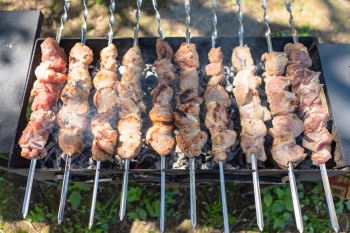
Jaanipäev, or Midsummer Day, is one of the most significant celebrations in Estonia, held on June 23-24. It marks the summer solstice and the height of the growing season. Bonfires are lit, symbolizing light and life. Food plays a key role, with grilling being a common activity. Traditional foods include shashlik, barbecued meats including grilled sausages and pork chops, often paired with potato salad. Seasonal vegetables are also featured, often in summer salads. Estonians often drink kali (a traditional fermented beverage made from rye bread) as they gather around bonfires late into the night.
Eesti Vabariigi aastapäev (Independence Day)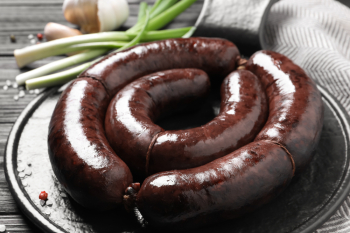
Celebrated on February 24, Estonia’s Independence Day commemorates the country’s declaration of independence in 1918. Official ceremonies include parades and speeches, but family gatherings and festive meals are at the heart of the day. Sült (jellied head cheese), rye bread, and potato salad are traditional staples. People also enjoy verivorstid (blood sausages) served with sauerkraut. These foods are tied to Estonia’s rural traditions and reflect the importance of preserving heritage.
Religious and Spiritual Occasions
Jõulud (Christmas)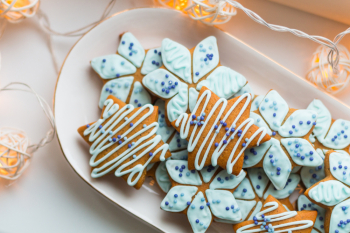
Christmas in Estonia is celebrated on December 24 and 25, with the focus on family gatherings, candle-lit churches, and hearty meals. Christmas dinner, usually featuring roast pork or goose, also often includes hapukapsus (sauerkraut), sült (jellied head cheese), and oven-roasted potatoes and apples. Lingonberry sauce and pickled pumpkin are common side dishes. Savory blood sausage made with grain is another Estonian Christmas specialty, while many prepare the country's national dish, mulgikapsad. This Estonian stew is prepared using sauerkraut, barley, and meat (normally bacon or smoked pork products). Piparkoogid (spiced gingerbread cookies) are a festive treat, often enjoyed with a cup of glögi (mulled wine).
Easter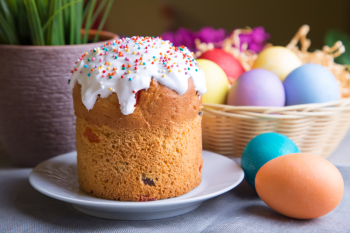
Easter in Estonia is referred to with different names, each with a particular meaning. Lihavõtted translates to "meat-taking holiday” and reflects the historical practice of abstaining from meat during Lent, with Easter marking the end of this period of fasting. Other names for the holiday include ületõusmispüha (Resurrection) and Munadepüha (egg holiday), and traditional Easter foods include eggs, symbolizing rebirth and fertility. Families often paint eggs and play various games with them and eggs may be mixed with butter for a spread. Roast lamb or pork is a traditional Easter meat and pasha—a cheese curd dish flavored with citrus peel and including dried fruit and nuts—is a traditional dish. Kama (a traditional Estonian grain mixture) and kulich, a sweet, yeasted bread flavored with dried fruits and a sugar glaze, also are eaten for Easter.
Life Milestones and Personal Celebrations
Weddings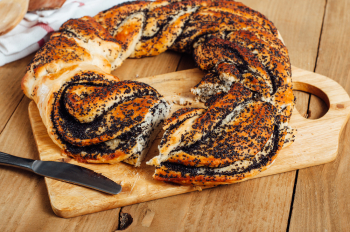
Estonian weddings are full of symbolic traditions, and food plays a central role in the celebration. The wedding feast typically includes roasted meats such as roast pork or lamb, accompanied by sauerkraut and potatoes, sometimes in the dish mulgipuder, made primarily from mashed potatoes and barley groats (also known as pearl barley). Sprat sandwiches are popular, as fresh sprat are plentiful in the Baltic Sea. The fish sandwich, called kiluvõileib, is often made with boiled egg slices and dark bread. Kringel (a sweet braided bread) is commonly served as a symbol of unity, with guests sharing pieces.
Birthdays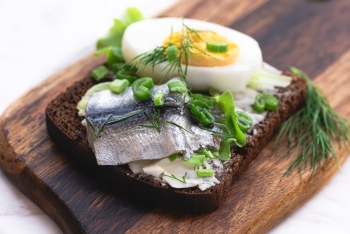
Estonians celebrate birthdays with a mix of family tradition and modern influences. Birthday tables often feature salads such as rosolje (a beet and potato salad) alongside smoked fish or sprat sandwiches called kiluvõileib. These are popular, as fresh sprat are plentiful in the Baltic Sea, with the fish sandwich made with slices of boiled egg and dark bread. Sünnipäevasalat (birthday salad) will commonly appear, with the salad made of potatoes, eggs, green peas, cucumber, onions, sausage, dill, and parsley mixed together with mayonnaise. Kringel (a sweet braided bread) and birthday cakes topped with seasonal fruits or cream are key highlights.
Cultural and Regional Festivals
Seto Kingdom Day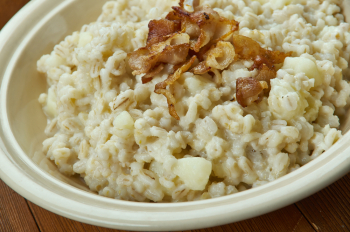
Seto Kingdom Day is a yearly festival that celebrates Seto traditions, culture, and identity. The ethnic group is from the southeastern region of Estonia near the Russian border. Seto Kingdom Day is a blend of historical pageantry and feasting. Foods that honor Seto culture include kamajahu—a flour mixture of roasted grains such as barley, rye, oats, and peas, typically eaten mixed with yogurt, kefir, or sour milk and sweetened with honey. Other popular foods are smoked fish and potato dishes, including mulgipuder, made primarily from mashed potatoes and barley groats (also known as pearl barley). Traditional blood sausages and black bread are enjoyed, as is sõir, a soft, fresh cheese made from curd cheese mixed with eggs, butter, and caraway seeds.
Laulupidu (Estonian Song Festival)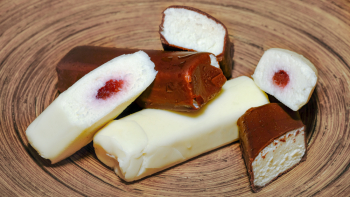
Laulupidu, Estonia’s famous Song Festival, occurs every five years and celebrates Estonian identity through music and national pride. Thousands gather for this event, which features not only singing but also food stalls serving traditional fare. Smoked sausages, potato pancakes, and black bread sandwiches filled with herring or smoked meat are popular among festival-goers. Kohuke (a sweet curd snack covered in chocolate) and leivasupp—a bread soup made with raisins, fruit juice, cinnamon, and sugar—offer sweet treats.
Viljandi Folk Music Festival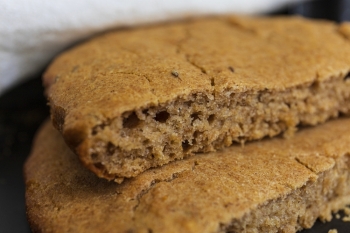
The Viljandi Folk Music Festival is held in July and is the largest annual music festival in Estonia, and one of the largest folk music festivals in Europe. Festival stalls sell traditional Estonian foods such as karask (barley bread), pea soup, and wild game stews. Many visitors enjoy wild berry pies and the honey wine, mead, as part of the experience.


